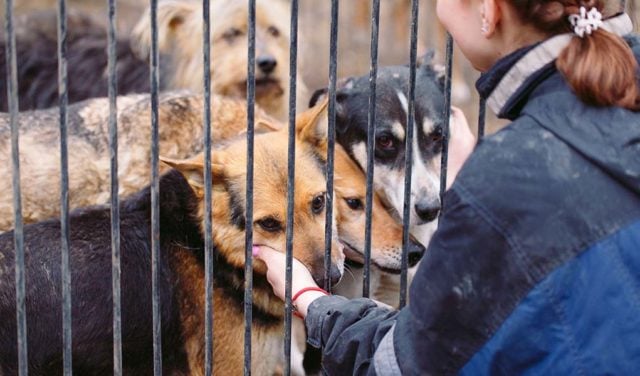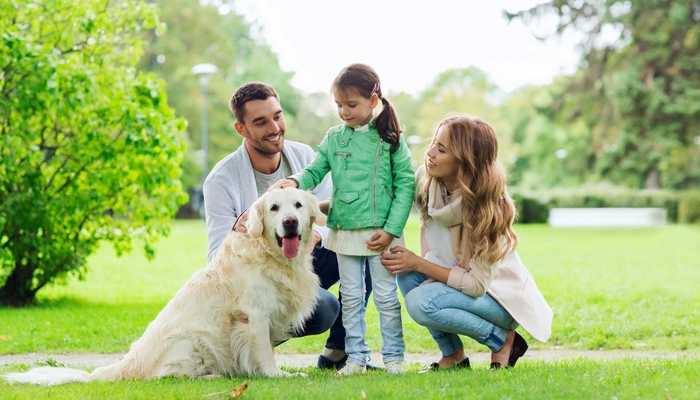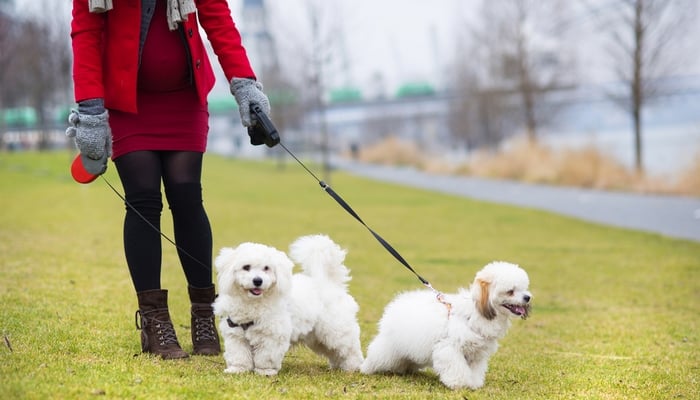
Table of Contents
- Are You Ready for a Dog? Answer these 27 Questions to Know
- Preparing Your Home
- 1. Do you currently rent a home? If so, does your landlord allow for dogs?
- 2. If your landlord does allow for dogs, are there any size limitations?
- 3. Are there limitations on the breeds of dog that you may own?
- 4. Does your landlord require a pet fee or pet rent?
- 5. Is your home large enough for a dog?
- 6. Is your home a safe environment for a dog?
- Preparing Your Family
- 7. Is the rest of your family on board with bringing a new dog home?
- 8. Do you have small children or children with medical conditions that may make having a dog dangerous?
- 9. Does anyone in your family have allergies to animals?
- 10. Is your family prepared to help with the responsibilities required to take care of a dog?
- Preparing Your Finances
- 11. Do you have the money to cover a pet deposit or pet rent?
- 12. Can you afford to feed your dog a high-quality dog food every day?
- 13. Can you afford to pay for preventative veterinary care?
- 14. Do you have funds set aside that could be used in the case of a veterinary emergency?
- 15. Can you afford to invest in pet insurance?
- 16. Can you afford homeowners insurance increases that may accompany bringing a new dog home?
- Your Occupation
- Your Responsibilities
- 19. Are you prepared to walk your dog multiple times daily in addition to regular bathroom breaks?
- 20. Are you prepared to commit to training your dog through a minimum of one professional obedience course?
- 21. Are you capable of coping with accidents within the house until your pet is trained?
- 22. Are you committed to socializing your dog properly?
- 23. Are you committed to providing care for the lifetime of your dog?
- 24. Are you prepared to put the needs of your dog above your own needs?
- 25. Are you prepared to be active with your new dog on a daily basis?
- 26. Are you prepared and able to seek out veterinary care any time that your dog may need it?
- 27. Do you have other pets that may not be compatible with a dog?
- Preparing Your Home
Owning a dog comes with a great degree of responsibility. Unlike some other pets, dogs require much of our time, effort, and resources to thrive. In order to be a responsible dog owner, you must be prepared to give all of these things and more.
Not only do you need to be prepared, but you need to be sure that every member of your family is ready for a new addition, even the furry members. Every member of your household will be sharing in the responsibility of caring for a dog. If you have other pets, they need to be able to deal with sharing their home with another animal.
There are so many things to think about before jumping into dog ownership. You may need to ask permission from a landlord or homeowners association. Maybe you need to make some changes around your home or yard to accommodate a dog. Adopting a canine companion is certainly not something to take on without giving it the proper consideration.
RELATED: 15 Must-Know Tips For New Dog Owners
Are You Ready for a Dog? Answer these 27 Questions to Know
Preparing Your Home
1. Do you currently rent a home? If so, does your landlord allow for dogs?
Most rental agreements have a pet policy of some sort included. This policy will state whether or not pets are permitted, if so, what types of pets are permitted, and any size, breed, or number restrictions on pets.
2. If your landlord does allow for dogs, are there any size limitations?
As mentioned above, rental agreements will often include size limitations on pets if pets are allowed. These limitations are particularly common in apartment buildings where larger pets could disturb neighbors above or below. The most common weight limitation among apartment buildings is 25 lbs.
3. Are there limitations on the breeds of dog that you may own?
Many rental units have breed limitations that you must be aware of when renting and considering a pet. Although these policies seem unfair, they are often established by insurance companies who make coverage less affordable or non-existent for landlords who accept particular “aggressive” or “dangerous” breeds.
Common breeds that are limited in rental units include Rottweilers, pit bulls, pit bull mixes, Dobermans, and Akitas. These restrictions are non-negotiable, so don't bother trying to get around them.
4. Does your landlord require a pet fee or pet rent?
Rental units that do permit pet ownership often require an upfront pet fee and may also require pet rent.
Additionally, some rental units may also require an increased security deposit to cover any damage caused to the rental unit by a pet or any cleaning processes that will need to be used to sanitize the home after the pet leaves.
Pet fees vary for apartment buildings and homes but tend to range between $200 to $400. Pet rent also varies but averages around $10 to $25 per month.
5. Is your home large enough for a dog?
Whether you rent or own your home, it’s important to consider whether or not you have the space for a dog. Do you live in a situation where the dog will always be underfoot and causing you frustration?
Consider the size of your home, the number of people currently living there, and the space that your chosen dog will require before bringing a new dog home. Most dogs will be content in any living arrangement, so long as they have enough exercise, but human family members can easily become frustrated when they feel cramped by the addition of a “new body” in the home.
6. Is your home a safe environment for a dog?
Is your home a cluttered mess? Are you a self-admitted hoarder? Do you or your children frequently drop or throw things on the floor that could be harmful if your new dog swallows them?
A dog doesn’t require you to be a “neat freak,” but they do “investigate” with their mouths, which can lead to eating foreign items. Assuming that your dog survives ingestion of a foreign item, you then face a very costly surgical intervention.
According to statistics, the current cost of surgery to remove an intestinal obstruction averages around $3,000. That's why it’s important that you are able to provide a safe and relatively tidy home for your new dog.
RELATED: How Not to Get Scammed Adopting a Puppy
Preparing Your Family
7. Is the rest of your family on board with bringing a new dog home?
When bringing a new dog into the family home, it is important that every family member is on board. Certainly, every home has their “decision maker”, but everyone must feel comfortable in their living situation, so it is important that everyone agrees!
It is not only the humans in a home who suffer when someone in the family doesn’t want a dog. Dogs are highly intuitive and sensitive creatures and pick up on feelings of negativity and resentment.
8. Do you have small children or children with medical conditions that may make having a dog dangerous?
Some children don’t do well with dogs. Children who have trouble reading body language, who show violent or aggressive behavior, who regularly act out, or who are otherwise defiant can pose a threat to any dog that comes into the family home.
For the safety of the dog and the child, it is not recommended that you bring a dog home into this type of relationship.
While special needs children and children with medical conditions can do very well with dogs, it is important to consider time constraints in these circumstances as well. Parents of these children are often overwhelmed with responsibility, and adding the additional responsibility of a dog into the mix can lead to problems.
9. Does anyone in your family have allergies to animals?
An incredible number of dogs that are adopted from shelters and rescues are returned shortly thereafter because someone in the family has “allergies.” Before you decide to bring a dog home, make sure that no one in your home has any type of allergy that could be exacerbated by the dog you are interested in.
You can do this by making multiple visits to the dog you want to adopt or asking for the dog to do an overnight stay with you before bringing him home permanently. It is important to note that while some dogs are advertised as being “hypoallergenic” simply because they have a specific type of fur, these dogs can cause allergies just as much as other dogs.
10. Is your family prepared to help with the responsibilities required to take care of a dog?
Taking care of a dog of any size requires commitment. There are many responsibilities that must be taken care of multiple times daily in order for your new dog to be happy.
It isn’t always possible for one person in the family to take care of all of these duties, such as walking, feeding, bathing, picking up after the dog, playing with him, putting the dog to bed, taking him to the vet, etc.
It’s important that at least one other family member is willing and able to help share in the responsibilities required in owning a dog.
RECOMMENDED: 25 Most Affordable Low-Cost Dog Breeds
Preparing Your Finances
11. Do you have the money to cover a pet deposit or pet rent?
As mentioned above, some rental units require an upfront pet deposit that must be paid before a dog is brought home. Additionally, you may be required to pay a monthly fee on top of your normal rent. Are you able to pay these fees and plan for pet rent in the future?
12. Can you afford to feed your dog a high-quality dog food every day?
A high-quality dog food is a food that offers your dog adequate nutrition for his age, size, and particular health needs. It is important that you are able to maintain high-quality dog food for your new dog so that he can remain healthy.
13. Can you afford to pay for preventative veterinary care?
Preventative veterinary care is not only necessary, but failure to provide such care to your dog is against the law in many areas. Such care includes a minimum of an annual check-up, mandatory vaccinations, and monthly flea/tick/heartworm preventatives.
14. Do you have funds set aside that could be used in the case of a veterinary emergency?
As with children, dogs have medical emergencies, and when these emergencies happen, veterinary clinics require payment at the time service is rendered. It is important that you have funds set aside to cover the cost of these services, which can vary significantly depending on your emergency and where you live.
15. Can you afford to invest in pet insurance?
Pet insurance is not mandatory in owning a dog, however, it can be beneficial in long-term savings. The cost of insuring your pooch, according to pet insurance statistics, can range anywhere from $4 to over $50 per month.
16. Can you afford homeowners insurance increases that may accompany bringing a new dog home?
Depending on where you live, who you have homeowner’s insurance through, and the type of dog you are interested in owning, you may face increases in your homeowner's insurance premiums. Make sure to research your policy prior to bringing a new dog home and make sure that you can cover any increases in your premiums.
RELATED: Dog Costs and Budgeting Guide for Pet Owners
Your Occupation
17. Does your job require you to travel often?
Dogs require companionship as well as regular care in order to be happy and healthy. If your job requires that you travel often and you will not be able to bring your dog with you, then it may not be the best time to have a pet.
18. Does your job require you to work long hours away from home?
Does your job require you to work more than a 40-hour work week? If so, and if they don’t provide you the opportunity to bring your dog to work or to work from home, then you may not have adequate time to devote to owning a dog at this time.
RELATED: 26-Step Checklist For Adopting A New Dog or Puppy
Your Responsibilities
19. Are you prepared to walk your dog multiple times daily in addition to regular bathroom breaks?
Dogs require regular exercise as well as bathroom breaks throughout the day. These breaks don’t happen only during commercials of your favorite programs or only when you are awake. Are you prepared to make time in your schedule to take care of these things without resentment?
20. Are you prepared to commit to training your dog through a minimum of one professional obedience course?
Dogs require training. Training not only teaches your dog how to behave well, but it also builds a method of communication between you and your pet. Without proper obedience training, you are not only facing a dog with behavior problems, but you also have a dog who really doesn’t understand what you expect from him.
21. Are you capable of coping with accidents within the house until your pet is trained?
Housetraining and obedience training don’t happen overnight. While your dog is learning the ropes, you are going to experience multiple accidents of every variety inside your home. Are you prepared to deal with these accidents with a cool head, as well as write off any property that gets soiled in the process?
VIDEO GUIDE: How To Housetrain A Dog or Puppy
Dogs must be socialized in order to be happy but also in order for them to be well-rounded dogs that are safe for others to be around. This means that you will need to take the time to expose your pet to other animals as well as people in a variety of settings and do so on a regular basis.
23. Are you committed to providing care for the lifetime of your dog?
Some dogs live longer than 18 years. When you bring a canine companion into your home, you must be prepared to care for him throughout all of those 18+ years. Failure to commit to this full-time frame can result in your dog being euthanized at a shelter because you don’t want him anymore.
24. Are you prepared to put the needs of your dog above your own needs?
There may be times when your dog needs something from you that forces you to make self-sacrifice. For example, you may incur unexpected veterinary expenses that will force you to sacrifice some of your “play money” in order to care for your pet.
25. Are you prepared to be active with your new dog on a daily basis?
Do you love having the life of a couch potato? Do you dread getting off the couch just to refill your drink? Then, it’s probably not the best time for you to get a dog. Even the biggest couch potato of a dog requires a minimum of one walk a day!
26. Are you prepared and able to seek out veterinary care any time that your dog may need it?
Your dog will rely on you for medical attention when he needs it. Are you prepared to seek out a veterinarian to provide that care whenever your dog needs it, even if money is tight? If the answer is no, then it’s not the right time for you to bring a new dog home!
27. Do you have other pets that may not be compatible with a dog?
Some dogs are not compatible with other pets, and some other pets are not compatible with dogs. When you are considering adding another pet to the household, it's important that they all get along harmoniously.
There may be an adjustment period when bringing a new pet home, and that is natural, but if, for example, you have an aggressive dog, then bringing home a second dog is never advised!
READ NEXT: How To Introduce A Dog To A Cat – A Quick Video Guide
















